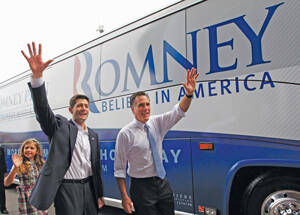Mitt Romney, in a bold redirection of his campaign and in an apparent appeal to waffling Catholic swing voters, named Wisconsin Republican Paul Ryan his running mate on Aug. 11. While Ryan’s pro-life views and his stance against same-sex marriage have been praised by some Catholics, his budget and tax proposals have drawn criticism from others, including the U.S. Conference of Catholic Bishops.
What Ryan’s elevation will mean to Catholic voters across the United States remains to be seen. Once considered to be a united front, today’s Catholic voters can be divided into three distinct groups, says Steve Schneck, director of the Institute for Policy Research and Catholic Studies at the Catholic University of America and a national co-chair of Catholics for Obama: (1) Latino Catholics, about 70 percent of whom favor Obama; (2) “intentional” Catholics, who tend to be more traditional and who favor Romney; and (3) cultural Catholics. This last group, Schneck says, are the Catholics for whom the two candidates will be competing.
Ryan makes a “fascinating selection,” said Schneck. He said Ryan’s fiscal proposals raise concerns about the well-being of the elderly, the poor and those in need of housing and education. “The long-term debt problem is scary, but the way we address it isn’t by shredding the minimal safety net,” Schneck argues. “It’s finding other sources of revenue. It’s asking the wealthy to pay their fair share of taxes.”
Dan Finn, a professor of economics and theology at St. John’s University in Collegeville, Minn., said that Ryan’s “individualistic economic analysis” leads the candidate to believe that reducing payments for welfare is actually good for people in poverty because welfare makes them dependent. This view, however, fails to see the larger framework necessary for an accurate analysis. “There are many causes of poverty. Dependency is certainly a problem for some, but for many it is not,” Finn said. “They’re working trying to make ends meet. What’s missing is the debate about the social and scientific analysis that undergird anyone’s position on this matter.”
The question of Catholic identity also has gained prominence because of the Ryan pick. Despite a shared faith, Ryan and Vice President Joe Biden hold opposing views on the legality of abortion, same-sex marriage and government assistance to the poor. The debate surrounding these issues has caused some voters to make judgments not just about who is a better candidate, but who is a better Catholic.
The divisions represent a “moment of truth” for the church, said the Rev. Bryan Massingale, a professor of systematic theology and ethics at Marquette University in Milwaukee, Wis. “Is there more to Catholic public identity than opposition to abortion and same-sex marriage?” he asked. “Everyone on the right and left would say, ‘Of course.’” But he argues that the question must be extended: Is there more to Catholic identity in reality than in rhetoric?
“Paul Ryan represents a group of Catholics who believe that as long as they’re with the church on abortion, then they get a pass on the rest of Catholic identity,” he said. “And I think there are some statements of our bishops that have fed into that. But we need to ask: How does our commitment to the poor and vulnerable factor into Catholic public identity and witness? The question goes deeper than Paul Ryan. He becomes a symbol of something that has been an ongoing conversation in the church and that we need to engage more forthrightly.”








